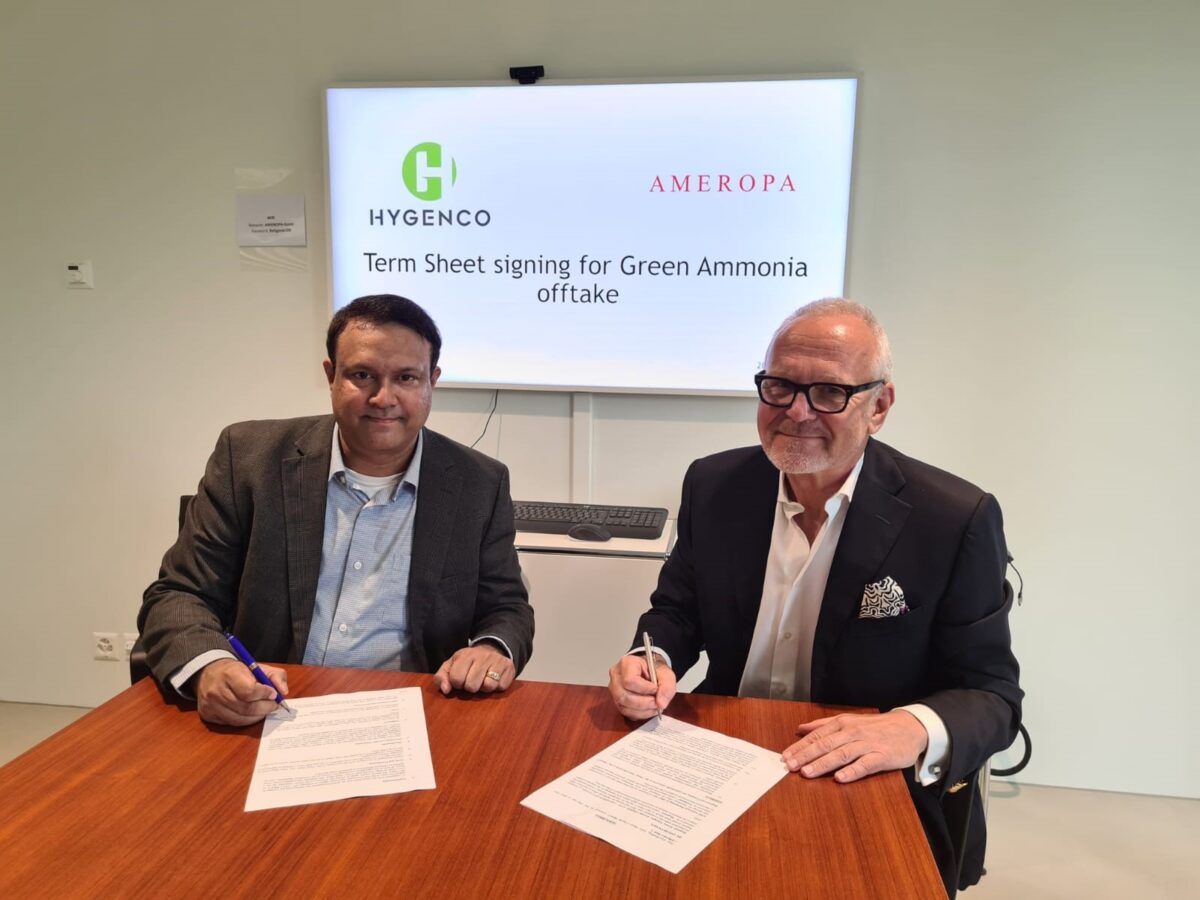India’s Hygenco Green Energies has signed a term sheet with Switzerland’s Ameropa for the potential supply of green ammonia from its planned green ammonia plant in India. This aims at enhancing green ammonia exports from India, supporting the global transition to renewable energy and sustainable agricultural practices.
Hygenco will produce green ammonia from its forthcoming project at the Gopalpur port in Odisha. The first phase of this project, with production capacity of 600 tpd, will achieve commercial operation by 2027. Phase 2a will double the capacity to 1,200 mtpd by early 2028. The project will reach its full production capacity of 1.1 mtpa of green ammonia by 2030.
Currently, Hygenco is purportedly the only Indian company with an operational commercial green hydrogen plant. Additionally, the company is currently developing multiple green hydrogen plants in India and plans to invest $2.5 billion in green hydrogen and green ammonia projects in the next three years.
Hygenco and Ameropa plan to start exporting green ammonia to Europe and Asian markets, focusing on establishing a reliable supply chain. The companies plan on capturing a significant share of the growing global low-carbon ammonia markets.
For Ameropa, the green ammonia will be pivotal to help the industry make low-impact fertilizers and grow sustainable agricultural practices globally. This will also significantly enhance the Swiss company’s indirect emissions reduction.
Headquartered in Gurgaon, India, Hygenco develops and deploys scaled-up commercially attractive green hydrogen and green ammonia assets.
Ameropa, headquartered in Binningen, BL, Switzerland, is a worldwide agriproducts merchant that also has integrated production, distribution, and retail assets in certain areas. As the largest independent trader for nitrogen (N) and phosphorus (P) crop nutrients, it has a long history in dealing with Ammonia.
Ameropa’s merchandising covers all regions of the world and is organized around three hubs located in Switzerland, Singapore, and Tampa. In terms of upstream and downstream footprints, it has established strong presence noticeably in Romania and Australia.
Rolls-Royce has started developing technologies for a “first-of-a-kind” hydrogen combustion engine for driving combined heat and power (CHP) systems. The company said that under the Phoenix project (funded by the German government), the consortium aims to match the power density and efficiency of current natural gas CHP units, reaching up to 2.5 MW. The project is getting nearly €5 million ($5.36 million) in funding from the German government and involves partners such as the Technical University of Munich’s Institute for Sustainable Mobile Propulsion Systems, Mahle Konzern, Fuchs Lubricants Germany, the German Federal Institute for Materials Research and Testing (BAM), and Robert Bosch.
Canada has enacted the first four Clean Economy Investment Tax Credits, which include the Carbon Capture, Utilization, and Storage (CCUS) ITC and the Clean Hydrogen ITC. The Canadian government said the CCUS ITC supports taxable Canadian corporations that incur eligible expenditures for qualified CCUS projects. The Clean Hydrogen ITC provides a 15 to 40 percent refundable tax credit for investments in hydrogen production projects, prioritizing those that produce the cleanest hydrogen. Eligibility may extend to equipment converting hydrogen into ammonia for transport purposes.
Lhyfe has built a 1 MW electrolyzer at a green hydrogen production plant for Deutsche Bahn in Tübingen, Germany. The electrolysis plant, which has an annual production capacity of up to 30 tons, uses green electricity from Deutsche Bahn’s green electricity portfolio. “At the Tübingen innovation hub, DB Energie is testing new technologies for sustainable rail energy supply, including in the “H2goesRail” project,” said the French hydrogen company. “Using the green hydrogen produced, a climate-neutral hydrogen train will be put into operation this year on a test route in Baden-Württemberg – between Tübingen, Horb and Pforzheim.”
Bergen Engines said its natural gas engines can now accommodate a 25% hydrogen blend without modification. “Building on the successful commercialization of a 15% hydrogen blend in 2022, this advancement marks a significant step toward greener and more sustainable energy solutions for land and marine applications,” said the Norwegian company.
This content is protected by copyright and may not be reused. If you want to cooperate with us and would like to reuse some of our content, please contact: editors@pv-magazine.com.









By submitting this form you agree to pv magazine using your data for the purposes of publishing your comment.
Your personal data will only be disclosed or otherwise transmitted to third parties for the purposes of spam filtering or if this is necessary for technical maintenance of the website. Any other transfer to third parties will not take place unless this is justified on the basis of applicable data protection regulations or if pv magazine is legally obliged to do so.
You may revoke this consent at any time with effect for the future, in which case your personal data will be deleted immediately. Otherwise, your data will be deleted if pv magazine has processed your request or the purpose of data storage is fulfilled.
Further information on data privacy can be found in our Data Protection Policy.